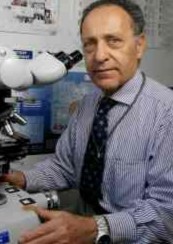Goodwill Message from the Foundation President
I feel glad and fortunate in having an opportunity to wish well to the Nigerian Journal of Haematology – the journal of the Nigerian Society for Haematology and Blood Transfusion – as its maiden issue is being published. I feel glad because founding a journal is a progressive initiative that will promote, in Africa, this important field within medicine and the medical sciences; and fortunate because I still remember the very day the Society was launched on 15 August 1972.
the journal of the Nigerian Society for Haematology and Blood Transfusion – as its maiden issue is being published. I feel glad because founding a journal is a progressive initiative that will promote, in Africa, this important field within medicine and the medical sciences; and fortunate because I still remember the very day the Society was launched on 15 August 1972.
Many things have happened in haematology in the following 45 years. Where we laboured with the Neubauer chamber and the likes, now there are electronic counters that generate a haemogram within minutes. Whereas we knew already the molecular basis of sickle cell anaemia, it was only in 1995 that for the first time a medicine – hydroxyurea – was officially validated as being effective for the treatment of this condition. Bone marrow transplantation, at the time an experimental procedure at best, has now become a major item in the therapeutic options for several blood diseases, including sickle cell anaemia: and it has been successfully carried out in Nigeria. That haematological malignancies arise through mutations followed by somatic cell selection was a vague concept at the time: one of its first validations came from the study, originally carried out in Africa, of the Burkitt tumour; and now identifying specific mutations is a must, in an increasing number of cases, in order that appropriately targeted therapy can be given to individual patients.
A journal is a means of communication and a means to record scholarly work. Not uncommonly scientific papers and clinical papers are seen as two alternative categories: but a strength of haematology has always been to straddle gallantly these two paths of research endeavours, and I am sure that through its pages the NJH will want to do this. One can also expect that a main focus of attention will be on those clinical problems that are more pressing in Nigeria; at the same time, I am confident that the NJH will strive to attract good papers from other parts of Africa and, indeed from elsewhere.
Haematology is biology and medicine; blood transfusion is a major medical service, one of those that most immediately save lives. Both haematology and blood transfusion face major challenges in Nigeria, such as reconciling increasing demands and increasing prices of consumables and drugs with the resources available. With all my heart I give my best wishes to the Editor Professor Norah Akinola and to her staff; and for NJH I wish a productive future: kila la heri, as we say in Tanzania. I am confident that the Nigerian Journal of Haematology will not only reflect, but also help to resolve such challenges.
Lucio Luzzatto, DSc (Hon) Ibadan,
Professor of Haematology, MUHAS, Dar-es-Salaam,
Foundation President of the Nigerian Society for Haematology and Blood Transfusion








